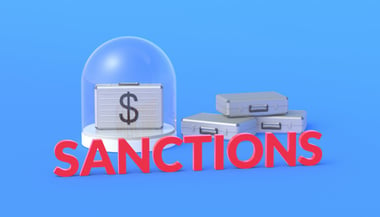What does OFAC stand for? OFAC stands for the Office of Foreign Assets Control. It is a department under the US Treasury that works towards administering and enforcing economic and trade sanctions, which is based on US foreign policy and national security goals.
OFAC imposes sanctions against targeted foreign countries and regimes, terrorists, international narcotics traffickers and people involved in the proliferation of weapons of mass destruction, according to its official site.
OFAC Sanctions Lists
OFAC maintains a number of sanctions lists, each addressing a different set of targets. The following are the major sanctions lists:
- The Specially Designated Nationals (SDN) List: It’s a list of people and businesses who are controlled by or operating on behalf of nations subject to US sanctions.
- The Consolidated Sanctions List: It’s a list that includes all sanctions data that isn’t included in the SDN list.
Other sanctions lists from OFAC include:
- The Non-SDN Palestinian Legislative Council List (Non-PLC List)
- The List of Foreign Financial Institutions Subject to Part 561 (Part 561 List)
- The Non-SDN Iranian Sanctions List (Non-ISA List)
- The Consolidated Sanctions List
- The List of Foreign Financial Institutions Subject to Correspondent Account or Payable-Through Account Sanctions (CAPTA List)
- The Sectoral Sanctions Identifications List (SSI List)
- The Foreign Sanctions Evaders List (FSE List)
- The Non-SDN Menu-Based Sanctions List (NS-MBS List)
The Types of OFAC Sanctions
Sanctions imposed by OFAC are divided into two categories:
- Comprehensive Sanctions: These prohibit any transactions between the United States and a sanctioned nation, such as North Korea, Syria, or Sudan.
- Non-comprehensive Sanctions: These restrict transactions between the US and a specific firm, individual, or industry, such as supporters or funders of an unfavourable political government.
What is the purpose of an OFAC check?
Companies and individuals based in the US must comply with trade sanctions and regulations mandated by OFAC. OFAC sanctions must be followed by all people, banks, financial services and other obligated institutions operating under the US regulators.
In order to ensure compliance with OFAC sanctions, financial institutions and some other obligated firms conduct an OFAC check. This includes incorporating an OFAC sanctions search into internal AML/CFT systems and ensuring that new customers and clients are vetted against the list before a commercial connection begins.
Noncompliance with sanctions, according to OFAC, is a severe danger to national security and foreign relations. As a result, anyone who violates OFAC sanctions without first acquiring the required licence may face serious legal consequences.
OFAC Compliance Programmes
To mitigate the risk of non-compliance with OFAC requirements and generally, as a sound banking practice, banks should establish and maintain an effective, written OFAC AML compliance programme.
The compliance programme should be commensurate with the OFAC risk profile based on products, services, customers, and geographic locations. OFAC AML compliance programmes should include:
- Identifying higher-risk areas
- Providing for appropriate internal controls for screening and reporting
- Establishing independent testing for compliance
- Designating a bank employee or employees as responsible for OFAC compliance
- Creating training programmes for appropriate personnel in all relevant areas of the bank
US companies are required to establish and maintain an efficient and effective OFAC compliance programme that is appropriate for the firm’s risk appetite. This risk appetite is related to the firm’s clients, beneficial owner, their transactions, products and services, and the geographic location from where they operate.
The firm’s risk profile is supposed to identify any high-risk jurisdictions and provide the internal controls which can be used to screen and report the customer’s transactions.
As part of OFAC compliance measures, the financial institution is required to hire a compliance officer who can keep appropriate training programmes for the employees. The compliance officer should make sure that the training programme is relevant to the bank’s risk profile.
What are the Benefits of Using a Sanctions Screening Tool?
There are no legislative requirements for how you must verify sanction lists. However, financial institutions often have the difficulty of finding a way to thoroughly and cost-effectively review the numerous sanctions lists without disturbing daily operations.
Manual checks would be difficult and time-consuming due to the large number of sanctions lists to be verified and can also easily lead to human error. Finding an automated system to complete these mandatory tests makes sense and is the simplest way to reach the compliance standards that regulators like OFAC require.
Tookitaki’s Smart Screening Solution
As an award-winning regulatory technology (RegTech) company, we are revolutionising financial crime detection and prevention for banks and fintechs with our cutting-edge solutions. We provide an end-to-end, AI-powered AML compliance platform, named the Anti-Money Laundering Suite (AMLS), with modular solutions that help financial institutions deal with the ever-changing financial crime landscape.
Our Smart Screening solution provides accurate screening of names and transactions across many languages and a continuous monitoring framework for comprehensive risk management. Our powerful name-matching engine screens and prioritises all name search hits, helping to achieve 80% precision and 90% recall levels in screening programmes of financial institutions.
The features of our Smart Screening solution include:
- Advanced machine learning engine that powers 50+ name-matching techniques
- Comprehensive matching enabled by using multiple attributes i.e; name, address, gender, date of birth, incorporation and more
- Individual language models to improve accuracy across 18+ languages and 10 different scripts
- Built-in transliteration engine for effective cross-lingual matching
- Scalable to support massive watch list data
Speak to one of our experts today to understand how our Smart Screening solution helps your compliance teams to ensure future-ready compliance programmes.
Anti-Financial Crime Compliance with Tookitaki?



